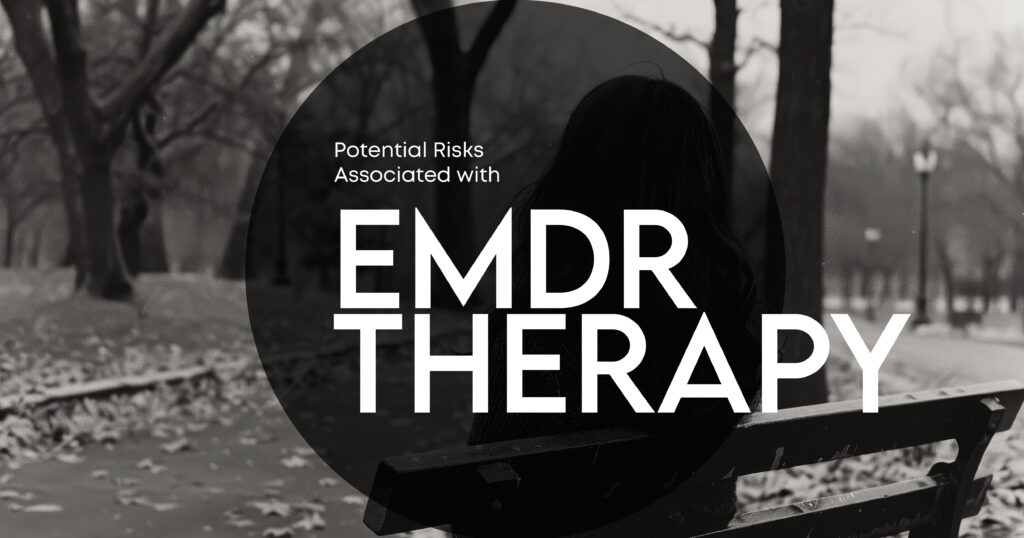EMDR therapy has received recognition as a highly powerful and effective way of treating trauma. It helps an individual to reprocess traumatic memories, reduce emotional distress, and optimize recovery. However, despite all the benefits, there is a need to evaluate the risks of EMDR therapy and learn more about these risks.
EMDR therapy, as well as any other therapy that undergoes a deep examination of the emotional past, has its side effects and psychological risks, particularly when administered by rather inexperienced representatives of the field of mental health.
Understanding the Risks of EMDR Therapy
EMDR therapy entails taking patients through traumatic or upsetting memories during the process by which they are subjected to bilateral stimulation – commonly by using eye movements, tapping, or sounds. This process stimulates the reprocessing of traumatic memories by the brain – however, it can also result in strong emotions or bodily responses.
The mental health risks of EMDR are primarily determined by the nature of the trauma. In severe trauma-infected individuals with unstable psychological states, the memory of traumatic events can temporarily aggravate the symptoms before they start to recover. Crying, intense flashbacks, deep physiological arousal such as increased heartbeat or sweating are not unusual throughout the sessions.

Although such reactions usually fade away, they are overwhelming when an individual is not well-supported. So, EMDR treatment should always be carried out by a certified practitioner who can control and supervise such reactions.
Nashville Mental Health
Common Side Effects of EMDR Therapy
Though EMDR is generally safe, it may cause short-term side effects, which may depend on individual differences. Such side effects may be emotional, psychological, and physical reactions in the aftermath of a session.
The following table summarizes a list of the most common side effects of EMDR therapy and their expected effects on patients.
| Side Effect | Description | Duration |
| Emotional Distress | Strong emotional reactions, including sadness, anger, or fear, as trauma surfaces | Temporary, usually resolves within hours or days |
| Vivid Dreams | Heightened dream activity or recurring trauma-related dreams | 1–2 nights post-session |
| Fatigue | Feeling mentally or physically drained after intense emotional processing | 1–2 days |
| Flashbacks | Temporary recurrence of traumatic memories during early sessions | Reduces over time with therapy |
| Physical Sensations | Muscle tension, headache, or nausea from emotional release | Short-lived |
| Increased Anxiety | Short-term anxiety or irritability between sessions | Typically, it lessens as therapy progresses |
Most of the side effects of the EMDR are temporary and the fact that the brain is dealing with challenging content. However, with these effects persisting or worsening, then you need to discuss with your therapist as soon as possible to re-adjust the rate or course of the treatment.
Assessing the Safety Concerns of EMDR Therapy
Although EMDR is perceived as one of the safest treatment methods, when used by inexperienced and untrained professionals, the lack of screening or preparation of clients with complex trauma, dissociative disorders, or depression or severe depression is a safety concern of EMDR therapy.
As an example, patients with weak coping skills can experience that the deep emotional work of EMDR leads to a stronger sense of distress or powerlessness. This may result in temporary dissociation or emotional instability in a very rare situation. These are not the failures of EMDR, but just indications that additional stabilization techniques are needed before continuing treatment.
Exploring the Psychological Risks Associated with EMDR
The mental risks associated with EMDR can be emotional swelling, uncovered repressed memories or a sense of powerlessness. Clients might experience the sensations, thoughts and feelings associated with traumatic experiences to a temporary extent whenever traumatic memories are triggered.
This may especially be tough when the individual fails at their post-traumatic stress disorder (PTSD) or any other trauma-related problem, as they may be highly affected through their emotional response, which may at times backfire against them. There are also complaints of temporary disorientation, mood changes, or a lack of differentiation between past and present experiences during and after sessions by other consumers.
What should not be forgotten is that these experiences are normally included in the healing process. The therapy is to reprocess the trauma in the brain that the brain should be taught to make it less emotional, that is, to transform painful memories into less painful and manageable memories.
Potential Adverse Effects of EMDR Therapy
In assessing the negative effects of EMDR therapy, it is necessary to consider the distinction between short-term and long-term problems. Although the majority of the population has short-term distress, a minority might have permanent problems.
EMDR has a number of negative effects, including:
- Rediscovery of repressed trauma memories that had never been known.
- Increased responsiveness to life stressors or emotional provocation.
- Acute enhancement of anxiety or depression.
- Active memory processing may cause difficulty falling asleep.
While these reactions can sound concerning, they typically signal that the brain is doing essential integration work. Continuous communication with your therapist is key to ensuring a safe and productive EMDR journey.
Addressing Controversies Surrounding EMDR Therapy
EMDR has been a controversial topic since it was developed in the late 1980s by mental health professionals. Critics say that the eye movement technique of the therapy has not been empirically grounded enough, whereas the proponents of the therapy refer to its strong outcomes in trauma recovery.
These controversies are mostly related to the methods and mechanisms involved in EMDR treatment. Are the movements of the eye what make the healing, or is it the elements of exposure and thinking processing? What is not disputed about EMDR is that one of the researchers is always in favor of this tool as one of the most effective in minimizing the effects of trauma. Both the American Psychological Association (APA) and World Health Organization (WHO) treat EMDR as an evidence-based therapy for PTSD.
The controversies do not deny its therapeutic effectiveness, but highlight the need to conduct additional scientific studies and control practice by a professional.
Evaluating Mental Health Risks in EMDR Therapy
EMDR has a strong connection with the mental health risks of an individual in relation to the trauma history of the individual and their emotional resilience. Individuals who have a severe mental illness like bipolar disorder, dissociative identity disorder, or complex PTSD can be further stabilized and then proceed with EMDR.
Clients can also be temporarily regressive – emotionally depressed – as past trauma is re-embodied. Nevertheless, these experiences can be stepping stones on the way to emotional management and healing with experienced guidance. Ultimately, EMDR’s success depends on a strong therapeutic alliance, careful pacing, and post-session support.
Nashville Mental Health
Safe and Supportive EMDR Guidance at Nashville Mental Health
At Nashville Mental Health, we understand that healing from trauma requires more than just clinical expertise – it demands empathy, patience, and safety. Our EMDR-trained professionals ensure that each session is conducted with care, pacing, and emotional grounding.
Contact Nashville Mental Health today to learn more and get on the path to recovery.

FAQs
What are the potential risks of EMDR therapy that patients should be aware of?
EMDR may cause temporary emotional distress, vivid dreams, or resurfacing of old memories. These effects are usually short-lived and part of the natural healing process.
How do the negative effects of EMDR compare to its benefits in mental health treatment?
While EMDR may cause brief discomfort, its long-term benefits in reducing trauma symptoms and improving emotional well-being typically outweigh the short-term challenges.
Can EMDR therapy lead to any psychological risks for certain individuals?
Yes, individuals with severe trauma or unstable mental health may experience temporary emotional flooding or anxiety during sessions, requiring careful pacing and professional guidance.
What are the common controversies surrounding the safety of EMDR therapy?
Debates often focus on whether eye movements are essential to EMDR’s effectiveness, though major health organizations recognize it as a validated trauma treatment.
Nashville Mental Health
Are there any specific adverse effects of EMDR therapy for people with pre-existing mental health conditions?
Those with conditions like dissociative disorders or severe depression may need stabilization first, as EMDR could temporarily intensify symptoms before improvement begins.





